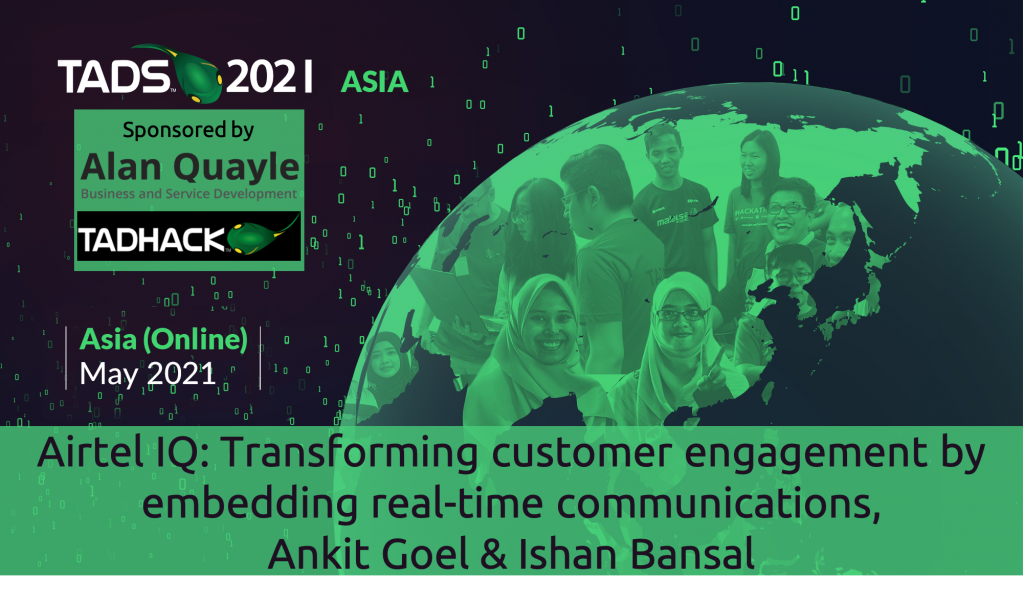Video and Slides
Outline: Airtel IQ: Transforming customer engagement by embedding real-time communications
Ankit Goel, VP & Head Engineering – Digital Enterprise Business at airtel X Labs
Ishan Bansal, Engineering at airtel X Labs
Airtel IQ is the first Telco grade unified cloud communication suite, that drives customer engagement – anytime anywhere.
- Customer experience – the brand differentiator
- Why Airtel – Challenges with existing Cloud communication platforms, market opportunity and Airtel advantage
- Make Marketing Smarter, Personalise Customer Experience, Make Operations Intelligent
- The platform – Robust, Intuitive, Secure (features under each capability area)
- Product Principles : Customer-first mindset
- Customer testimonials
Presentation Review
You can ask Ankit and Ishan questions either in the comments section of this weblog, or contact them directly, their details are at the end of the presentation.
I’m grateful Ankit and Ishan are able to share their experiences with Airtel IQ. It’s a great example of telcos being successful in taking control of their service and the successful use of open source. And also provides insight into the unique value telcos can provide beyond wholesale services or reselling other service providers who also go direct to the enterprise.
Ankit highlights the challenges in using cloud communication services from other than the telco:
- Deployment complexity due to physical telecom infrastructure integration
- High cost due to the need for third-party MSP (Managed Service Provider)
- Poor service quality due to cloud-telecom integration inconsistency
- Cumbersome troubleshooting during downtime due to multiple stakeholders
- Lack of a unified data protection framework that complies with stringent regulations
The 3 core propositions of Airtel IQ are: Robust, Intuitive, and Secure.
Ishan goes into detail on how they achieve a robust service describing how its architected and the advantages of being built in the network. Next he described the intuitive aspects in providing APIs, self-service and service components. Making it easy for businesses to create workflows and services for their specific needs. And finally Ishan walks through the main components of the platform’s security.
Ishan then described how airtel was able to create Airtel IQ. He reviews the product principles and iterative customer-led approach. This is the hardest aspect, successfully innovating within a telco.
Ankit reviews some of the customer benefits:
- Improved marketing with click to call, omni-channel, and analytics;
- Improved customer experience with personalized IVR, automations, and analytics;
- Improved operations with security, notifications, alerts, and of course analytics.
Ankit wraps with excellent case studies of Rapido, Swiggy and Justdial.
Thank you Ankit and Ishan is showing how a telco can take control of their future in communication services with Airtel IQ, well done!


Well done Ankit and Ishan, what you’ve achieved with Airtel IQ is impressive. It’s a template for other telcos to take back control of their future in communication services. I have a few questions:
1) I’ve seen in other telcos similar small teams create innovative new services, which when it comes to rolling out, the old ‘new product approval processes’ stall the project. How did you avoid that?
2) The importance of analytics, dashboards and insights comes through strong in the customer benefits and use cases. What technologies did you use?
3) How did you overcome the barriers to using open source with a telco?
4) What are your plans for the future of Airtel IQ?
Thanks Alan for the oppurtunity !
1. We believed in this product. The Product Management was aligned on the oppurtunity and its potential, and the Engineering was all excited. And we had to roll out fast. So we set this up as an Incubation project with hyper focused teams working with literally no-rules, like a start-up. We ensured this team doesn’t get stuck on anything – process or technology.
2. Reporting and Analytics is one of the key features of Airtel IQ. We have both call analytics and voice analytics available on our platform. It is highly customizable for the enterprise customers specific use cases. For call analytics, we chose Elastic Search as the data sink, and Kibana for visualization plugged into our customer portal. For voice analytics, we leverage our Start-up Accelerator Program partner Voicezen. We also have a strong in-house capability on voice analytics which we will plug into IQ in near future.
3. Airtel has embraced open source since long for building scalable products for our customers. So it was not a barrier for us.
4. We plan to support additional communication channels for a comprehensive omni-channel capability, and be a one-stop shop for all communication requirements of customers of all scale, to enable their business with real time communications.